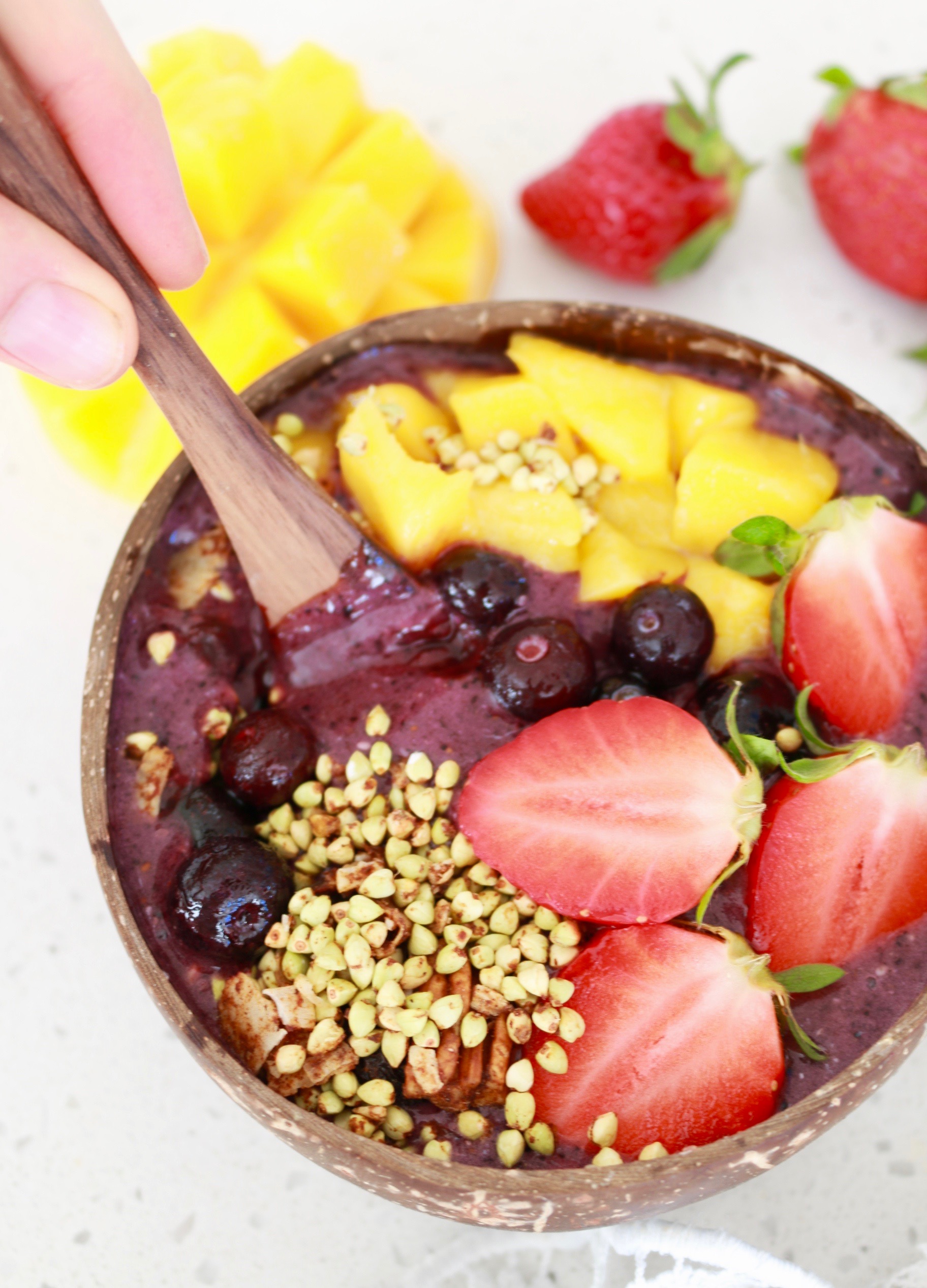How Much Fruit is Too Much?
We all know fruit is nutritious and great for us. However, a question I get asked on a daily basis is 'how much fruit is too much?'. Or 'what about all the sugar?'
The anti-sugar trend has led many people to believe that because fruit is quite high in sugar, especially a type of sugar called fructose, that it's bad for us or at least should be limited. According to these ideas, fruit spikes blood sugar and insulin levels, causes weight gain, is linked to acne and poor skin, and more. Basically, fruit has been thrown in the same box as refined, processed white sugar. Because sugar is sugar, our bodies can't tell the difference...right? Not so fast!
Yes, fruit does contain sugar. But it is SO much more than that. What fruit also contains is a whole lot of fibre, water, antioxidants, vitamins and minerals, in the perfectly packaged form of a whole food. When we eat these whole foods, the nutrient package they come in work together in a way harmonious way, providing a great number of health benefits! Fibre, for example, works to slow digestion and the release of sugar into the bloodstream, preventing those blood sugar and insulin spikes that people blame fruit for causing. I am a type 1 diabetic and even eating very generous amounts of fruit and fruity smoothie bowls doesn't cause my blood sugar to spike (as long as I dose my insulin accordingly, as with all foods!)...so it won't spike yours either!
While processed and refined sugar definitely isn't a very nutritious or health-promoting food, it's also important to know that sugar isn't inherently the 'cause' of weight gain, or any other health conditions. Eating an excess of calories to your body's needs, an overall poor quality diet and living a sedentary lifestyle, over the course of a long time, will lead to weight gain. Just like there is no magic pill that can fix everything, there is no one food that can be blamed for causing poor health!
A quick DISCLAIMER: As part of a wholesome and balanced diet that’s full of fruit, veggies, legumes and other nutritious plant foods, enjoying some foods which do contain processed sugars can be a perfectly healthy part of that (and good for the soul!). Remember, just like one salad won’t make you ‘healthy’, one cookie won’t make you ‘unhealthy’. And as I’ve said many times, stressing about sugar is actually worse for you than a bit if sugar in your diet is in the first place!
Back to the fruit: Because fruit is so filling and satisfying, due to the beautiful, natural taste and high fibre, water, antioxidant and micronutrient content, it's virtually impossible to overeat on fruit...and fruit is definitely not the problem. Most people in fact are not eating ENOUGH fruit!
Let's move on to fructose. Fructose is demonised due to it's association with liver damage, and again, claims that there is no difference between fructose in high fructose corn syrup to that in fruit. This is not true.
Studies show that only the industrially made fructose is associated with negative heath effects, such as liver damage and high blood pressure. Fructose found in it's natural form in fruit, is not. One study in particular, compared the effects of a diet restricting all fructose to one restricting only fructose from added sugars, but including fruit. The people with the diet that ate the fruit did better, and even lost more weight than those not!
Even in type 2 diabetics - a condition of too much sugar in the bloodstream - only received benefits from increased whole fruit intake, according to current literature. In fact, studies have even shown that having a piece of fruit with meals can lower the blood sugar spike in response to that meal! Two different studies observed people eating TWENTY servings of fruit per day (that's 200g of fructose, the amount in about 8 cans of soft drink!), and they only found BENEFITS, such as improved body weight, blood pressure and cholesterol and triglyceride levels after 3-6 months.
Fruit is one of the most health-promoting and nutritious foods you could possibly eat. It's been proven to be anti-inflammatory, improve artery function, improve gut health and reduce constipation, reduce cancer risk, reduce risk of obesity and so much more. Studies done all across the globe have shown relationships between increased fruit intake and higher life satisfaction, improved mental health and increased happiness and positivity among populations. This is thought to be, again, due to the nutrient content, such as fibre and vitamin C, which promote the formation of dopamine and serotonin - the so-called 'feel good' neurotransmitters!
Is there such thing as eating too much fruit?
In most cases, not really! Unless you are eating so much fruit that you are missing out on other important foods and food groups, such as vegetables and legumes, which could possibly lead to macro or micronutrient deficiencies, or prevent you from reaching your energy needs. For example, I wouldn’t recommend eating only fruit for a meal, balance is key!
To sum all these science-y fruit facts up:
Fruit, just like all whole plant foods, is rich in essential micronutrients, disease-protecting antioxidants, water and fibre, which is incredibly important for gut health and digestion, blood sugar balance, satiety, chronic disease prevention and so much more. As animal products and refined foods contain next to no fibre, most people aren't getting anywhere near enough - which is one of the BIGGEST contributors to poor health.
Don't be scared of fruit, feel the need to limit your fruit intake or feel guilty for eating it. Fruit is a whole plant food, grown on trees, that is completely natural and tastes DELICIOUS. Embrace the amazing nutritious, tasty and health-promoting food that nature has created for us, and reap the benefits of eating more fruit!





